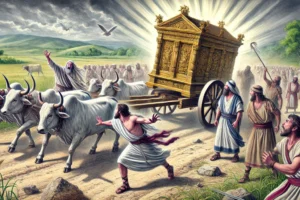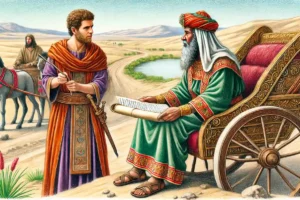
Nebuchadnezzar’s Madness
Nebuchadnezzar’s madness is recounted in Daniel 4 in the Bible, showcasing a profound narrative of pride, punishment, and restoration. Here are the key points:
- Divine Dream and Prophecy: Nebuchadnezzar had a troubling dream, which Daniel interpreted. The dream foreshadowed that Nebuchadnezzar would suffer from a divine affliction as a result of his pride.
- Period of Madness: Fulfilling the prophecy, Nebuchadnezzar experienced a period of madness where he was driven away from people and lived like a wild animal, including eating grass like an ox.
- Duration: His madness lasted for seven periods, traditionally interpreted as seven years, during which he was completely separated from human society.
- Restoration: After this period, Nebuchadnezzar acknowledged the sovereignty of God, resulting in the restoration of his sanity and his kingdom. He praised and honored God, acknowledging His eternal dominion.
- Theological Implications: This episode serves as a cautionary tale about the dangers of hubris and the importance of recognizing divine authority over human power.
- Historical Context: Nebuchadnezzar II was a real historical figure, reigning as king of Babylon from approximately 605 to 562 BCE. His reign included the conquest of Jerusalem and the subsequent Babylonian Captivity of the Jews.
“Immediately what had been said about Nebuchadnezzar was fulfilled. He was driven away from people and ate grass like the ox. His body was drenched with the dew of heaven until his hair grew like the feathers of an eagle and his nails like the claws of a bird.”
Daniel 4:33
The account of Nebuchadnezzar’s madness, as detailed in Daniel 4, offers a profound narrative layered with theological, psychological, and historical dimensions. This episode serves as both a personal admonition to Nebuchadnezzar and a universal lesson on the perils of human pride in the face of divine authority.
Theological Context
In the Book of Daniel, the story of Nebuchadnezzar’s madness appears as a theological critique of imperial arrogance. Nebuchadnezzar, after acknowledging the power of the Hebrew God through earlier experiences with Daniel and his companions, continues to exhibit signs of hubris and self-glorification. His dream of a great tree that reaches to the heavens, which Daniel interprets as a symbol of Nebuchadnezzar’s vast empire, is a divine warning. The subsequent fulfillment of this dream, where Nebuchadnezzar descends into madness, underscores a recurring biblical theme: God opposes the proud but gives grace to the humble (James 4:6).
Psychological Interpretation
From a psychological viewpoint, Nebuchadnezzar’s condition can be considered a symbolic representation of boanthropy, a delusional state where a person believes they are an ox or similar animal. In Nebuchadnezzar’s case, this state is induced as a divine punishment for his pride and is manifested by his living outdoors, eating grass, and growing long hair and nails, resembling an animal more than a man. This transformation can be seen as an external manifestation of his internal state of confusion and disorientation, brought about by his failure to acknowledge his power as derived from and limited by God.
Historical and Literary Analysis
Historically, Nebuchadnezzar II was a real figure, noted for his conquests and the construction of the Hanging Gardens of Babylon. However, there are no extrabiblical records of his madness, suggesting that this narrative may serve a more symbolic and instructive purpose rather than a strictly historical account. The text’s structure as a royal proclamation, ending with Nebuchadnezzar’s acknowledgment of God’s sovereignty, follows a pattern of humiliation and restoration that is common in biblical texts.
Restoration and Redemption
After seven periods, likely years, of madness, Nebuchadnezzar restores his reason, looks up to heaven, and praises God, leading to his restoration as king. This reflects the biblical covenant theme, where restoration follows repentance. Nebuchadnezzar’s final speech praises God’s everlasting dominion and his own recognition of human kingship as fleeting and dependent on divine will. This restoration is not only personal but also political, as it restores order and acknowledges divine kingship over earthly realms.
Conclusion
Nebuchadnezzar’s episode of madness is a multifaceted narrative that serves as a cautionary tale about the limits of human authority and the necessity of divine recognition. It teaches about the dangers of pride and the importance of humility before God. Theologically, it affirms God’s control over history and kings, while psychologically, it explores the depths of human consciousness altered by divine intervention. Historically, it situates these themes within the life of a well-known ancient monarch, thereby linking the spiritual lessons with tangible historical figures and events.



